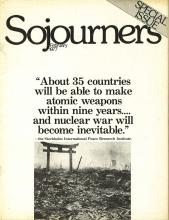In 1959 Karl Barth, an influential Protestant theologian, declared that the most vital issue facing Christianity is the inability of the church to take a definite stand against nuclear weapons.
Theologically, Barth was known for his refutation of liberalism. His biblical theology stood firmly anchored in traditional Protestant orthodoxy, which meant that he was by no means a secular humanist. Indeed, in his Church Dogmatics, Barth rarely made even passing reference to current political affairs. Why, then, did this conservative church man maintain that the most pressing issue for Christianity had to do with nuclear weapons?
To understand Barth’s position, we must remember his remarkable role in the formation of the confessing church in Nazi Germany. With the beginning of Nazi rule, Hitler effectively silenced Christians by signing a concordat with the Catholic Church and by organizing the larger Protestant churches under a National Socialist “Reich Bishop.” With the churches under firm control, professing Christians quickly rallied behind the cult of the Fuhrer, the Nazi ideology of the “Aryan race,” and the notion of the divine election of Germany for a pre-eminent role in human destiny. In contrast to this captivity of the churches, a remnant of faithful Christians gathered together to form the confessing church, adopting the “Barmen Declaration” which had been written by Barth.
The members of the confessing church saw clearly what was at stake. The struggle against the madness which had infested Germany did not merely involve a few political issues or a few questions of ecclesiastical structure; rather, the very essence of the faith was at stake. In its opening paragraphs, the Barmen Declaration proclaimed, “Jesus Christ, as he is attested for us in the Holy Scripture, is the one Word of God which we have to hear and which we have to trust and obey in life and in death.”
Read the Full Article

